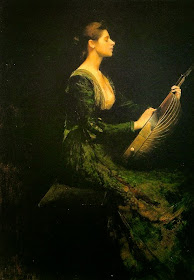"The key to the mystery of a great artist is that for reasons
unknown, he will give away his energies and his life just
to make sure that one note follows another... and leaves us
with the feeling that something is right in the world."
AUTHOR: Leonard Bernstein
of beauty for the rest of us to enjoy."
COMPOSER
VIVALDI









MEANING OF THE QUOTE:
"Artists devote their lives to the creationof beauty for the rest of us to enjoy."
COMPOSER
VIVALDI
| http://www.dreamstime.com/royalty-free-stock-photo-portrait-antonio-vivaldi-image19823705 |
Julian Bream, Lute


This work was originally scored for
the lute (not guitar) as soloist wit
an accompaniment of two violins
(without violas) and continuo (a
the lute (not guitar) as soloist wit
an accompaniment of two violins
(without violas) and continuo (a
keyboard part that fills in the harmony
implied by the bass line). During
Vivaldi's time the cumbersome to play
plucked lute, an instrument which had
been popular for three hundred years,
was starting to be replaced by more
favored keyboard instruments like the
harpsichord,
| Jan Steen: A Young Woman playing a Harpsichord to a Young Man (probably 1659) |
which was, in effect, a mechanized lute
as pressing a key down on a harpsicord
initiated a plectrum to pluck a string of
the instrument's internal harp.
| http://commons.wikimedia.org/wiki/File:Harpsichord_jack_action.svg |
Today much of the lute repetoire is
performed by the guitar (its predecessor)
however in recent years some classical
in order to perform the music in its
original form.
There are three movements in this rather
short piece which are divided into the
conventional fast-slow-fast sequence
of Allegro giusto, Largo, and Allegro.
The slow movement has become
very well known.
Description of the Baroque Lute
SUBSTITUTING A GUITAR FOR THE LUTE.
MAKE YOUR OWN COMPARISON.
John Williams, Guitar
Orquesta Sinfónica de Sevilla
| Portrait of A Lutenist, c. Late 17th Century |
| Francois de Troy: Charles Mouton the Lutanist, 1690 |
| Bernardo Strozzi: Lute Player, 1635 |
| Hendrick ter Brugghen: A Man playing a Lute, 1624 |
| Caravaggio: The Lute Player, 1595 |
| Portrait of a Man Playing a Lute, 1576 |
| Parrasio Micheli: Young Woman playing a Lute, c.1570 |



| Annibale Carracci: Portrait of a Lute Player (Venetian composer Giovanni Gabrieli 1554~1557-1612), c.1593-94 |



| John Dowland: Famous English Renaissance Composer and Lutenist (1563-1626) |
| Giovanni Cariani: 16th Century Lute Player |
| Bartolomeo Veneto: Lady Playing Lute |
 |
| Leonardo da Vinci: Angel in Red With Lute, c1500 |
| Melozzo da Forli: Angel with Lute, 1480 |
 |
| Piero della Francesca: Nativity (detail), c1470 |
| Musician Angels (Flute and Lute)Detail of fresco of the Assumption of the Virgin from the Chapel of the Virgin, 14th C |
 |
| Minstrels with Rebec and Lute, 13th C |
INTRO. TO INSTRUMENTS
GRANADA
1. PERCUSSION INSTRUMENT REVIEW
a. Percussion Worksheets done in class
2. RECORDERS
a. Reviewing first sounds with echoing
HILLVIEW
1. KEYBOARDS
a. Directions on how to use
b. Playing BAG SONGS
GRANADA
1. PERCUSSION INSTRUMENT REVIEW
a. Percussion Worksheets done in class
2. RECORDERS
a. Reviewing first sounds with echoing
HILLVIEW
1. KEYBOARDS
a. Directions on how to use
b. Playing BAG SONGS
GRANADA BEG. STRINGS
1. SHIFTING THE SCALE
a. 1st finger shifting up on each string
2. HO HEY
1. SHIFTING THE SCALE
a. 1st finger shifting up on each string
2. HO HEY
HILLVIEW ORCHESTRA
1. LAS MANANITAS II
a. Sight Reading
1. LAS MANANITAS II
a. Sight Reading







